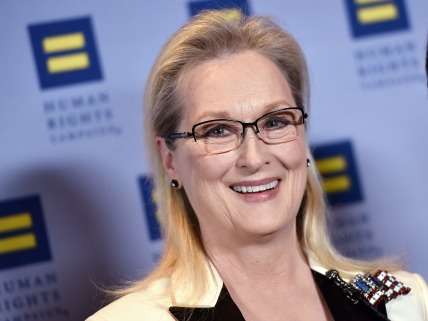Meryl Streep Congratulates Herself (Again) for Criticizing Donald Trump
The Hollywood star's self-dramatizing self-righteousness plays right into the president's hands.

In a speech on Saturday night, Meryl Streep once again congratulated herself on her courage in criticizing Donald Trump. "It's embarrassing and terrifying to put the target on your forehead," she said, "and it sets you up for all sorts of troll attacks and armies of brownshirt bots and worse, and the only way you can do it is if you feel you have to. You have to. You have no choice, but you have to speak up and stand up and act up."
The occasion was a Human Rights Campaign (HRC) gala at the Waldorf Astoria in Manhattan, where Streep received a National Ally for Equality Award. In this context, it is hard to give Streep points for bravery. If she had stood before an audience of LGBTQ activists and their progressive supporters to defend Trump, that would have demonstrated courage. Confirming the unanimous opinion of her listeners and portraying Trump's critics (including Streep herself) as bold dissidents seems more like a profile in conformity.
Likewise, it did not take much gumption for Streep to criticize Trump, then the president-elect, at last month's Golden Globe Awards, where the acclaimed actress told her audience of Hollywood stars and movie critics that "you and all of us in this room really belong to the most vilified segments in American society right now." By Streep's account, the burden of defending culture and decency against Trump and his philistine horde has fallen upon her and her rich and famous friends, and they must not shrink from the challenge.
Streep did pay a price for (accurately) portraying Trump as a crude bully: The president elect, who in 2015 described her as an "excellent" actress and "a fine person," decided she was "one of the most over-rated actresses in Hollywood," thereby illustrating her point that the blowhard billionaire prefers ad hominem attacks to logical argument. Streep alluded to that Twitter slam in her speech at the HRC gala, describing herself as "the most overrated, overdecorated and, currently, overberated actress, who likes football, of my generation."
The football reference was a joke about another joke. In her Golden Globes speech, Streep had warned that "Hollywood is crawling with outsiders and foreigners, and if we kick them all out, you'll have nothing to watch but football and mixed martial arts, which are not the arts." The remark struck many people as a condescending swipe at Trump's benighted supporters. Streep acknowledged the backlash during her HRC speech, saying, "I was making a joke, and Mike Nichols told me, 'If you have to explain the joke, Meryl, you're doomed.'" Yes, of course it was a joke, but it was a joke at the expense of the uncultured rubes Streep and her friends seem to imagine when they think of Trump voters.
"It isn't helpful to make it us versus them," Streep acknowledged on Saturday. But by continuing to portray herself and her privileged social circle as the valiant resistance against everything Trump represents, she only reinforced a Manichean view in which wealthy celebrities (except for Trump) risk everything to defend civilization against the encroaching darkness.
"If we live through this precarious moment," Streep said, "if his catastrophic instinct to retaliate doesn't lead us to nuclear winter, we will have much to thank our current leader for. He will have woken us up to how fragile freedom is. His whisperers will have alerted us to potential flaws in the balance of power in government. To how we have relied on the goodwill and selflessness of most previous occupants of the Oval Office."
Streep's claim that Trump is uniquely selfish or malevolent is not only dubious but irrelevant. The point of checks and balances is that they protect us against liberty-threatening power grabs, regardless of the motives behind them. As Louis Brandeis observed, "The greatest dangers to liberty lurk in insidious encroachment by men of zeal, well-meaning but without understanding." If the Trump presidency reawakens progressives to the importance of limiting executive power, that would indeed be a positive development. It would be even better if they remembered that lesson the next time a Democrat occupies the White House.
In the meantime, Trump's critics, if they want to persuade anyone, should keep their complaints factual and focused. There is plenty of evidence to support Streep's description of Trump as a bully with "an instinct to humiliate." There is less reason to think that Trump—a socially liberal New Yorker who says he's "fine" with gay marriage, whose convention speech featured a promise to "do everything in my power to protect our LGBTQ citizens from the violence and oppression of a hateful foreign ideology," and whose daughter and son-in-law, both influential advisers, are supporters of LGBTQ rights—is bent on bringing back "the bad old days of ignorance and harassment, oppression and hiding who we are," as Streep implied in her HRC speech.
This eyebrow-raising hyperbole is accompanied by an equally off-putting self-righteousness, which slides easily into self-dramatization. Documentarian Ken Burns, who introduced Streep, preemptively minimized the risk she faces by talking about how awful the president is. "They're too scared of her to do anything," he said, "especially when she reminds us constantly when the emperors of the world have no clothes. They're too embarrassed to do anything but hide in their castles and tweet." But to hear Streep tell it, risking an insulting tweet from the president is an act of heroic defiance. "The whip of the executive," she said, "can through a Twitter feed lash and intimidate, punish and humiliate, delegitimize the press and imagined enemies with spasmodic irregularity and easily provoked predictability."
More than one side in this spat may be guilty of easily provoked predictability. Trump, who built a presidential campaign on his scorn for political correctness, needs hyperventilating critics like Streep, just as they need him.


Show Comments (143)